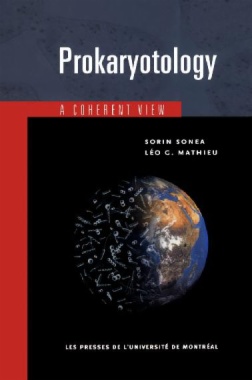Ce livre en anglais porte sur la génétique des bactéries. Il propose de considérer les procaryotes comme un mégaorganisme à l'échelle planétaire, un système biologique de communication, où les gènes s'échangent à l'avantage de l'ensemble de la communauté. Ce livre oppose le monde des procaryotes et celui des eucaryotes, il montre que les stratégies de survie diffèrent fondamentalement de l'un à l'autre, de sorte qu'on pourrait parler d'une évolution non darwinienne des procaryotes dont le rôle a été fondamental dans l'évolution générale de la vie sur Terre. Sorin Sonea et Léo G. Mathieu ont été professeurs au département de microbiologie et d'immunologie de la Faculté de médecine de l'Université de Montréal.
- CONTENTS
- FOREWORD
- CHAPTER I: UNEVEN DEVELOPMENT OF THE SCIENCE OF BACTERIOLOGY
- 1. The importance of pathogenic bacteria in the early developments of bacteriology
- 2. Progressive discovery of solidarity among prokaryotes
- a) Mixed communities with division of labor
- b) Horizontal gene exchanges
- 3. Modifying the old concept of bacteria
- 4. Changes in the perception of prokaryotes' evolution
- 5. Discovery of the Archaebacteria (Archaea)
- 6. The prokaryotic world: a unified and essential element of life on our planet
- 7. Many biologists are not sufficiently aware of the unique characteristics of the prokaryotic world
- CHAPTER II: MAJOR CHARACTERISTICS OF THE PROKARYOTIC WORLD
- 1. Prokaryotic cell structure and functions
- a) The cell wall of prokaryotes
- b) The prokaryotic plasmic (inner) membrane is a multi-purpose organ
- c) Prokaryotic ribosomes differ from those of eukaryotes
- d) Capsules and glycocalyces
- e) DNA in the prokaryotic cell
- f) Prokaryotic spores are a survival form of extraordinary resistance
- 2. Dominant role of generalized solidarity in the life of prokaryotes
- a) Mutually-supportive associations among different prokaryotic cells in local communities
- b) Scope and importance of gene exchanges between different prokaryotic cells: A general way of solving problems and adapting to temporary changes
- 3. The prokaryotic entity forms one planetary biologic system or superorganism
- CHAPTER III: ORIGINAL, NON-DARWINIAN EVOLUTION OF PROKARYOTES
- 1. Ways in which errors in the division of the earliest cells could be prevented or compensated for
- 2. Variety and diversification inside the early prokaryotic clone
- 3. Prokaryotic cells evolved together towards both high specialization and complementarity
- 4. The appearance of the prokaryotic cell wall and of transformation
- 5. Small replicons became the most efficient basic elements of a prokaryotic global communication system
- 6. The prokaryotic superorganism (or biologic system) as a unique type of clonal entity; there are no prokaryotic species
- 7. Role of prokaryotes in the origin and subsequent evolution of eukaryotes
- 8. The prokaryotes started as and remain the most influential biological factor in the development and the maintenance of our biosphere
- CONCLUSION
- REFERENCES
- INDEX

